
Meteora: The Sky-High Marvel of Greece
Meteora, located in central Greece, is a place like no other. Known for its towering rock formations, this UNESCO World Heritage site is home to one of the most important complexes of Eastern Orthodox monasteries. The monasteries are perched on top of these natural pillars, creating an awe-inspiring sight that seems to defy gravity. Visitors to Meteora can explore these ancient monasteries, many of which are still active today. The Great Meteoron Monastery is the largest and offers a glimpse into the monastic life with its museum and stunning views. The Holy Trinity Monastery, accessible by a steep footpath, is known for its dramatic setting and appearance in the James Bond film 'For Your Eyes Only.' Beyond the monasteries, Meteora offers a range of outdoor activities. Hiking trails weave through the landscape, allowing tourists to experience the natural beauty up close. Rock climbing is another popular activity, drawing adventurers from around the world to scale the impressive cliffs. Whether you're a history buff, a nature lover, or an adrenaline junkie, Meteora provides a unique and unforgettable experience.
Local tips in Meteora
- Wear comfortable shoes for climbing stairs and hiking trails.
- Visit early in the day to avoid the crowds and heat.
- Respect the dress code when visiting monasteries; shoulders and knees should be covered.
- Bring a camera with a good zoom lens for capturing the distant monasteries.
- Check opening hours in advance as some monasteries close on specific days.
Meteora: The Sky-High Marvel of Greece
Meteora, located in central Greece, is a place like no other. Known for its towering rock formations, this UNESCO World Heritage site is home to one of the most important complexes of Eastern Orthodox monasteries. The monasteries are perched on top of these natural pillars, creating an awe-inspiring sight that seems to defy gravity. Visitors to Meteora can explore these ancient monasteries, many of which are still active today. The Great Meteoron Monastery is the largest and offers a glimpse into the monastic life with its museum and stunning views. The Holy Trinity Monastery, accessible by a steep footpath, is known for its dramatic setting and appearance in the James Bond film 'For Your Eyes Only.' Beyond the monasteries, Meteora offers a range of outdoor activities. Hiking trails weave through the landscape, allowing tourists to experience the natural beauty up close. Rock climbing is another popular activity, drawing adventurers from around the world to scale the impressive cliffs. Whether you're a history buff, a nature lover, or an adrenaline junkie, Meteora provides a unique and unforgettable experience.
When is the best time to go to Meteora?
Iconic landmarks you can’t miss
Holy Monastery of the Great Meteoron -Transfiguration of the Saviour
Discover the awe-inspiring Holy Monastery of the Great Meteoron, a UNESCO World Heritage site offering breathtaking views and rich spiritual heritage in Meteora, Greece.
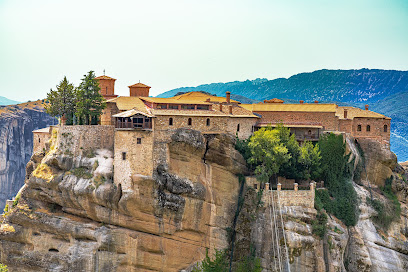
Monastery of Varlaam
Discover the breathtaking Monastery of Varlaam in Meteora, Greece: a historic monastic complex with stunning views and rich Byzantine art.
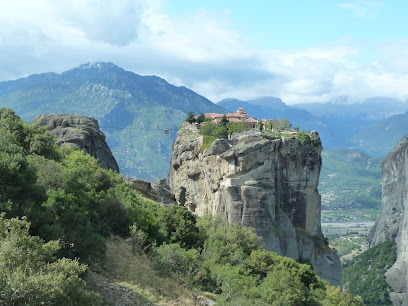
Holy Monastery of Saint Stephan
Discover Meteora's spiritual heart at the easily accessible Holy Monastery of Saint Stephen, offering stunning views and a glimpse into monastic life.
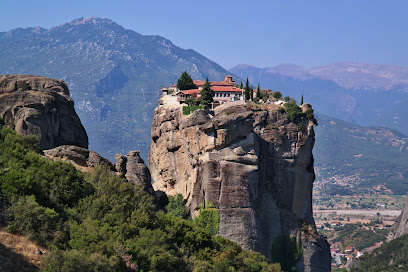
Monastery of the Holy Trinity at Meteora
Experience breathtaking views and centuries of history at this iconic Meteora monastery, perched atop a towering rock formation.
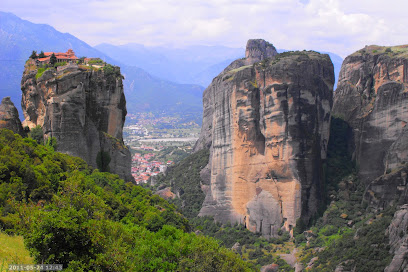
Natural History Museum of Meteora and Mushroom Museum
Explore the natural wonders of Meteora with fascinating animal exhibits and a unique mushroom collection in a family-friendly museum.
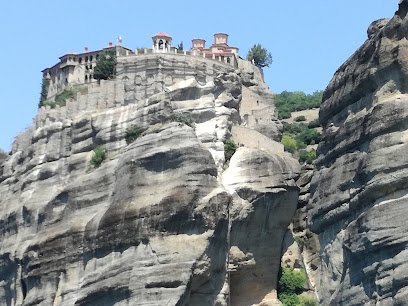
Holy Monastery of Rousanos - Saint Barbara
Discover the Holy Monastery of Rousanos in Meteora: A stunning nunnery perched atop a rock, offering history, art, and breathtaking views.
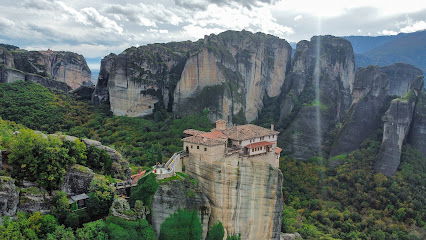
Holy Monastery of Saint Nicholas Anapafsas at Meteora
Discover Meteora's Holy Monastery of Saint Nicholas Anapafsas: A vertically built marvel with stunning frescoes and panoramic views.
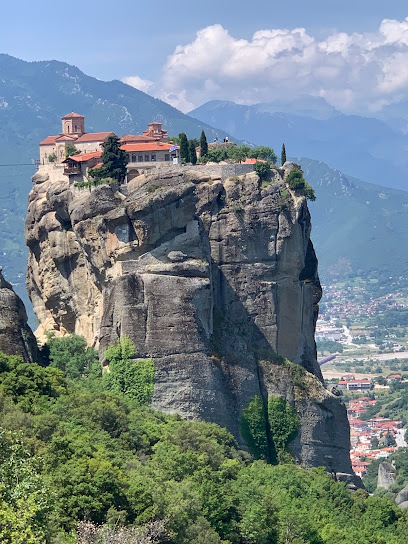
Main Observation Deck of Meteora
Witness the breathtaking beauty of Meteora from this easily accessible observation point, offering panoramic views of ancient monasteries and stunning rock formations.
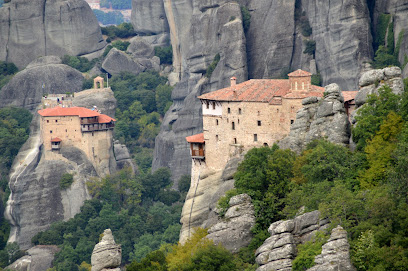
Museum of Geological Formations of Meteora
Explore Meteora's geological past at this unique museum in Kastraki, revealing the secrets behind its iconic rock formations.
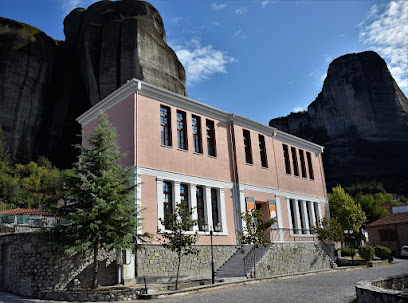
Holy Monastery of Agio Theodoroi
Discover the serene Holy Monastery of Agio Theodoroi in Meteora, a spiritual sanctuary offering stunning views and a glimpse into Greek monastic tradition.
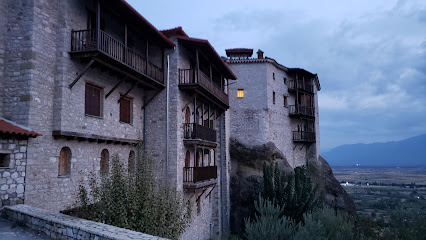
Holy Monastery Vytouma, Kalampaka, Trikala
Discover the serene beauty & spiritual heritage of Holy Monastery Vytouma in Kalampaka, Greece, with its stunning views & rich history.
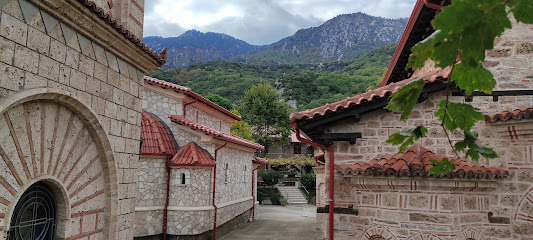
Point de vue
Discover breathtaking panoramic views of the Greek countryside at this scenic overlook near Políchni, a perfect spot for photographers and nature lovers.
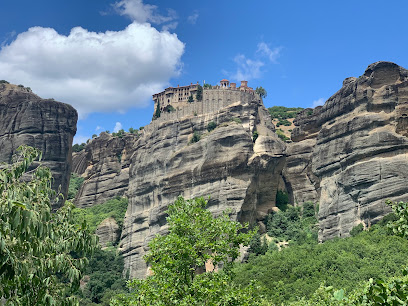
Metéōra
Discover Meteora's breathtaking monasteries: a spiritual journey through history, art, and stunning landscapes in the heart of Greece.

Meteora, Greece
Discover Meteora's breathtaking monasteries, where faith and nature converge in a stunning landscape of towering rock formations and spiritual havens.
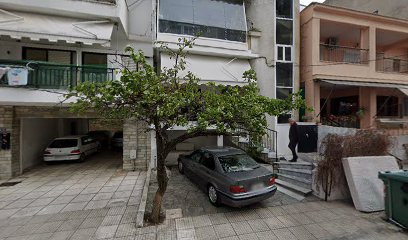
Unmissable attractions to see
Holy Monastery of the Great Meteoron - Transfiguration of the Saviour
Discover the breathtaking beauty and spiritual serenity of the Holy Monastery of the Great Meteoron, a UNESCO World Heritage Site in Greece.
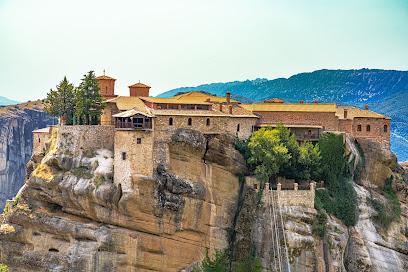
Metsovo Square
Experience the enchanting Metsovo Square, a cultural gem in Greece's Pindus mountains, filled with local charm, delicious food, and breathtaking views.
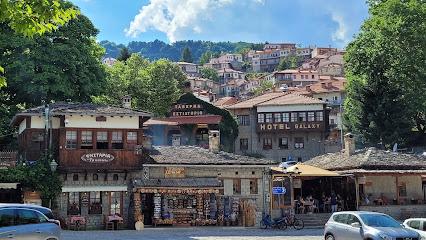
Monastery of the Holy Trinity at Meteora
Explore the Monastery of the Holy Trinity at Meteora, a stunning blend of spirituality, history, and breathtaking views in Greece's iconic landscape.
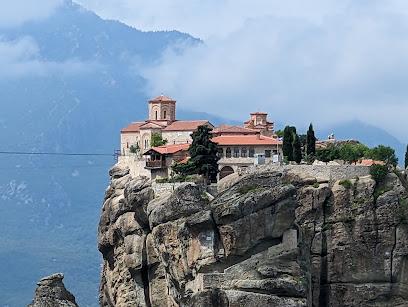
Holy Monastery of Saint Stephen
Discover the captivating history and breathtaking views at the Holy Monastery of Saint Stephen in Kalampaka, a true gem of Greek spirituality.
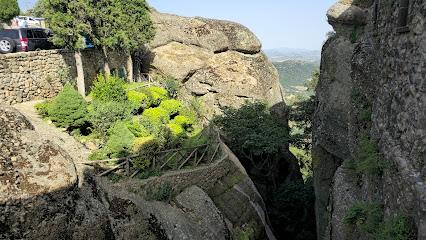
Holy Monastery of Rousanos - Saint Barbara
Experience the serenity and beauty of the Holy Monastery of Rousanos, a stunning nunnery in Meteora, rich in history and breathtaking scenery.
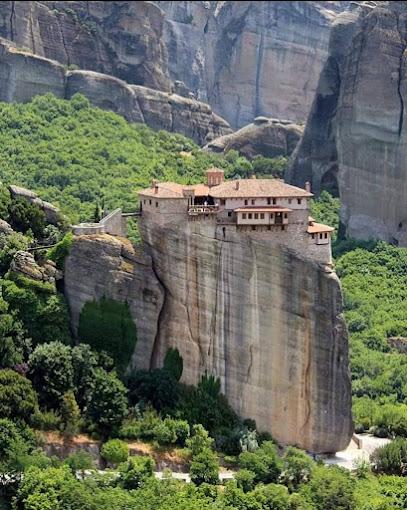
Natural History Museum of Meteora and Mushroom Museum
Explore the rich biodiversity of Meteora at the Natural History Museum, featuring unique exhibits and a fascinating mushroom collection.
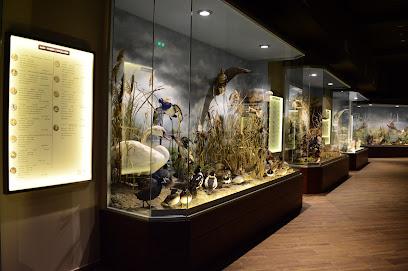
Holy Monastery of Saint Nicholas Anapafsas at Meteora
Explore the Holy Monastery of Saint Nicholas Anapafsas, a breathtaking spiritual retreat nestled amidst Meteora's iconic rock formations.
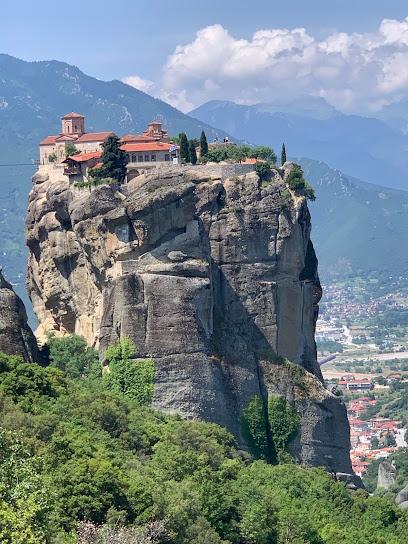
Byzantine Castle of Trikala
Explore the Byzantine Castle of Trikala, a historical gem with stunning views and rich cultural significance, perfect for every traveler in Greece.
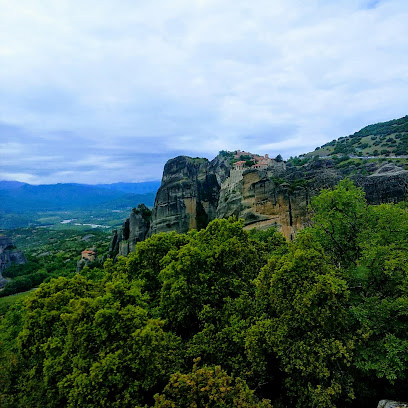
Holy Kipinas Monastery
Discover the tranquil beauty and rich history of Holy Kipinas Monastery in North Tzoumerka, a serene retreat amidst breathtaking landscapes.
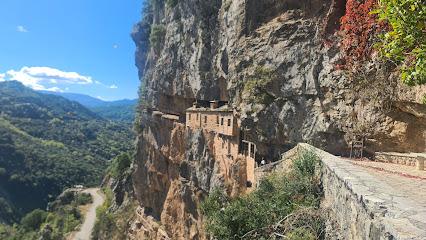
Lake Plastiras
Experience the serene charm of Lake Plastiras, a picturesque reservoir in Greece perfect for outdoor activities and breathtaking landscapes.
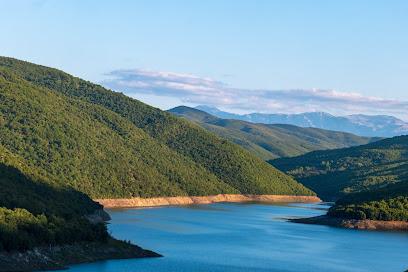
Mparos Pass
Explore the breathtaking Mparos Pass in North Tzoumerka, Greece, a perfect blend of stunning landscapes and outdoor adventures for nature lovers.
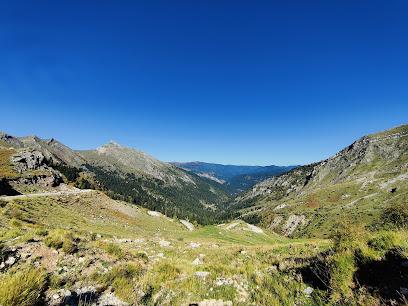
Katogi Averoff Hotel & Winery
Experience the finest wines and luxury accommodation at Katogi Averoff Hotel & Winery in the heart of Metsovo, Greece.
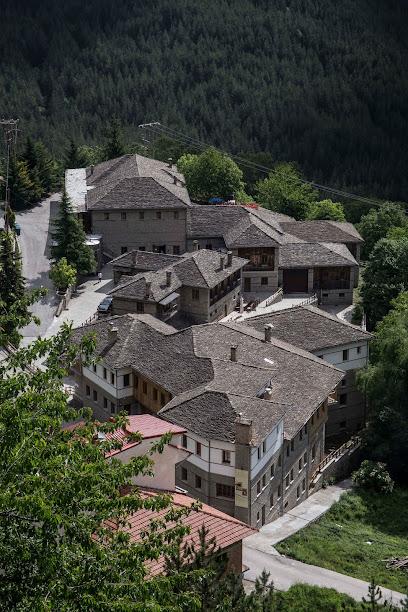
Meteora Digital Projection Center
Discover the breathtaking history and geology of Meteora through cutting-edge 3D technology at the Meteora Digital Projection Center.
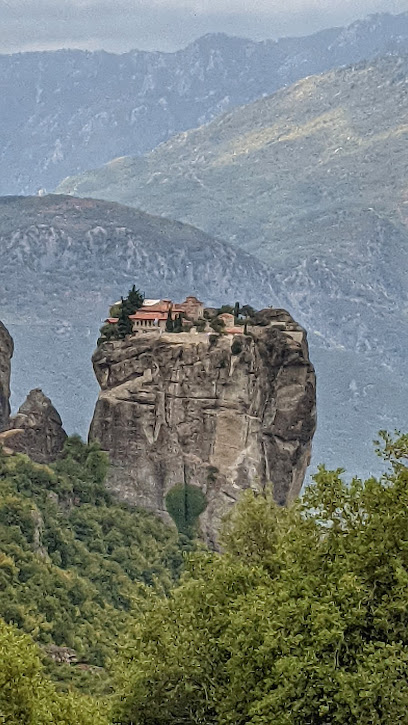
Greek Education Museum
Explore the profound history and evolution of education in Greece at the Greek Education Museum in Kalabaka, near the stunning Meteora.
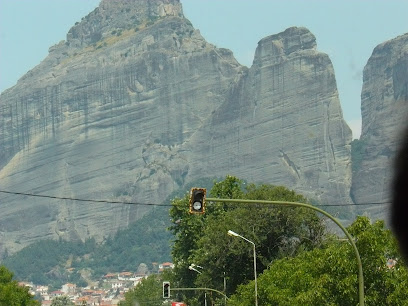
Kouiassa Waterfalls
Experience the breathtaking beauty of Kouiassa Waterfalls in Kalarites, Greece – a serene escape into nature's majestic landscapes.
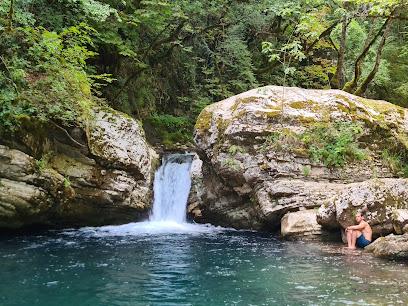
Essential places to dine
Restaurant Meteora Gkertsou Family
Experience authentic Greek flavors at Restaurant Meteora Gkertsou Family in Kalampaka - where tradition meets breathtaking views.
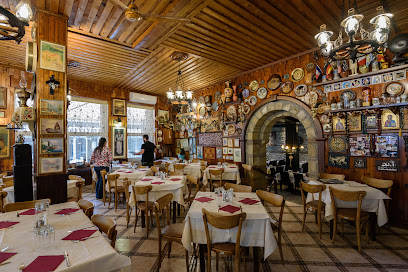
Meteoron Panorama
Discover authentic Greek flavors at Meteoron Panorama with breathtaking views over Meteora's majestic rock formations.
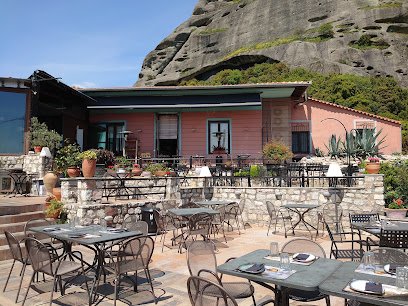
Panellinio
Discover the flavors of Greece at Panellinio in Kalampaka, where exquisite Mediterranean cuisine meets breathtaking views of Meteora.
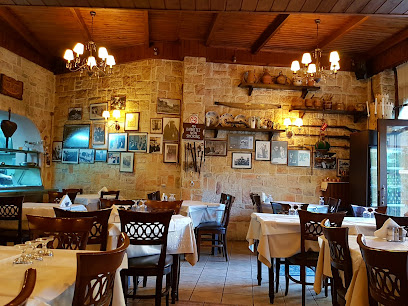
Feel the Rocks
Discover authentic Greek cuisine with breathtaking views at Feel the Rocks in Kalampaka.
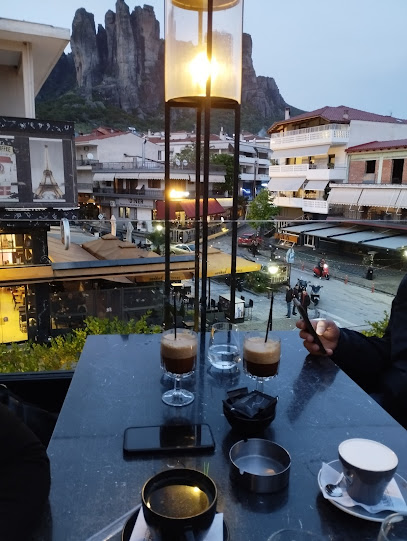
Taverna Gardenia
Experience authentic Greek cuisine with stunning views at Taverna Gardenia in Kastraki near Meteora.
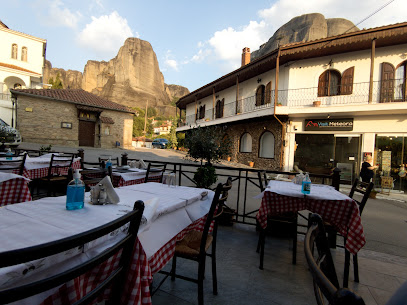
Boufidis Greek Tavern
Discover the true flavors of Greece at Boufidis Greek Tavern in Kastraki – where tradition meets taste!
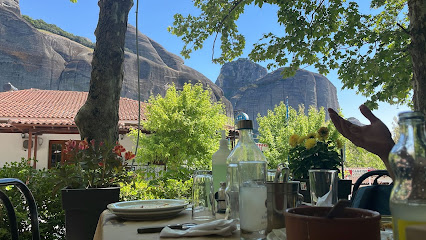
Meteora Vavitsas Restaurant
Discover authentic Greek flavors at Meteora Vavitsas Restaurant, set against the breathtaking backdrop of Meteora's majestic cliffs.
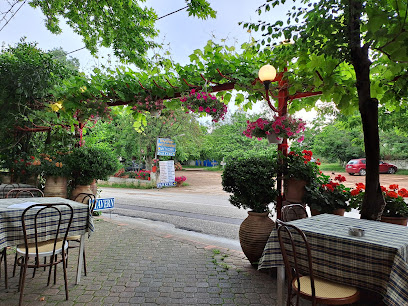
Fortounis Tsipouradiko
Experience authentic Greek flavors at Fortounis Tsipouradiko, a charming small plates restaurant in Kalampaka offering delightful meze and stunning views.
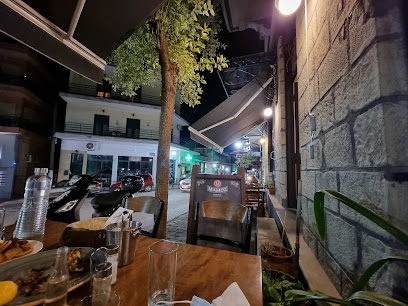
Taverna Efrosino
Experience authentic Greek cuisine at Taverna Efrosino while enjoying breathtaking views of Meteora's iconic rock formations.
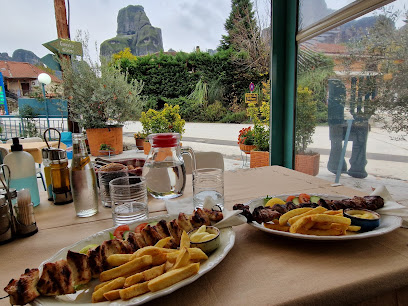
Archontariki Taberna
Discover authentic Greek cuisine at Archontariki Taberna in Kalampaka – where every meal is a celebration of local flavors.
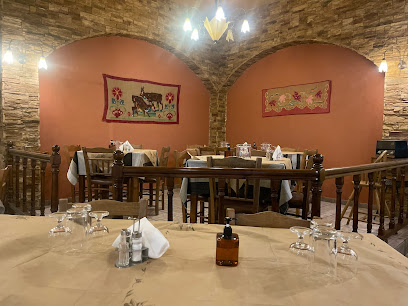
Elias Garden
Discover authentic Greek cuisine and live music at Elias Garden in Kalampaka—an unmissable culinary experience surrounded by stunning natural beauty.
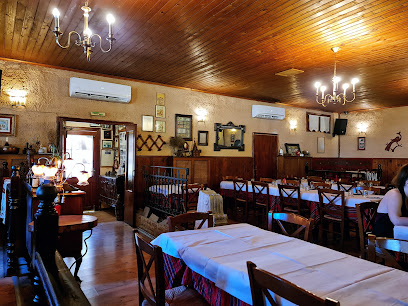
Valia Calda Taverna Restaurant
Discover authentic Greek cuisine amidst the breathtaking beauty of Meteora at Valia Calda Taverna.
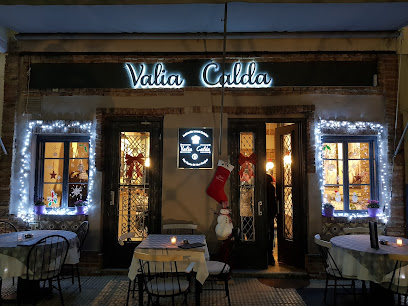
Polyzos
Savor the rich flavors of Greece at Polyzos, where authentic barbecue meets stunning views in Kalampaka.
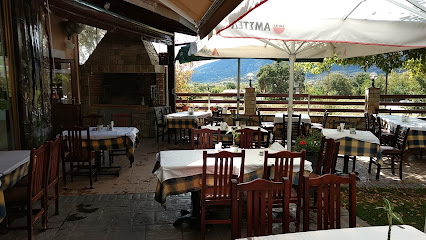
Maglaras
Discover Maglaras in Kalampaka: where authentic Greek cuisine meets breathtaking views.
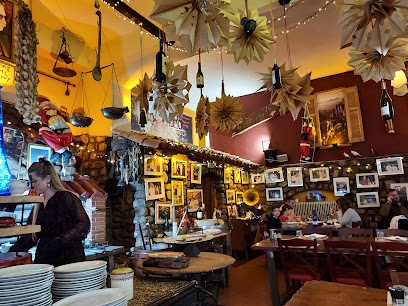
Ταβέρνα του Ζιώγα
Experience authentic Greek flavors at Ταβέρνα του Ζιώγα in Kastraki – where tradition meets taste amidst breathtaking scenery.
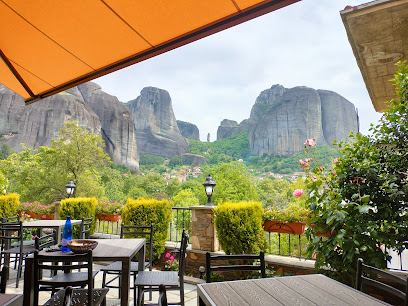
Markets, malls and hidden boutiques
Lidl
Explore affordable shopping at Lidl in Kalampaka, Greece, your one-stop supermarket for all essentials and local delights.
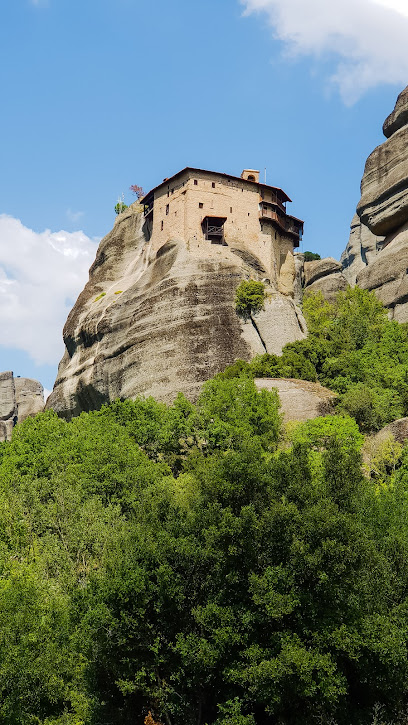
Zindros Byzantine Icons Workshop - Retail Store 1
Discover the artistry of Byzantine icons at Zindros Workshop, where tradition meets craftsmanship in the heart of Kalambaka.
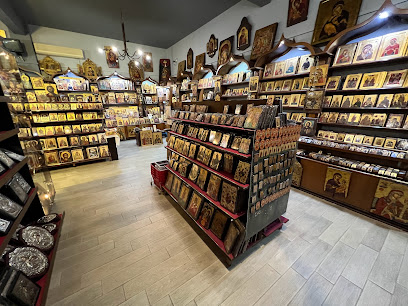
Zervopoulos Icons
Explore the beauty of handmade Greek icons and local delicacies at Zervopoulos Icons in Kalabaka, a unique cultural experience!
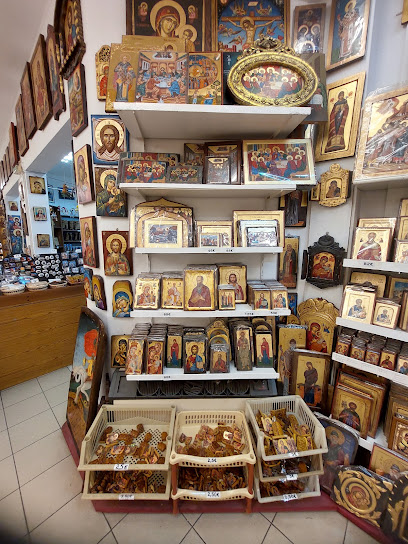
Meteorashop.gr - Χειροποίητες εικόνες & Μοναστηριακά Προϊόντα
Explore unique handcrafted church supplies at Meteorashop.gr in Trikala, Greece, where spirituality meets exquisite craftsmanship.
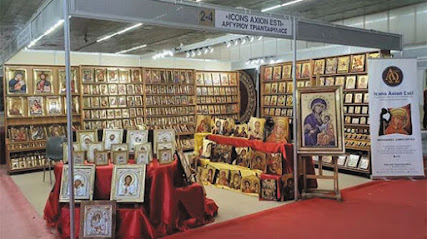
Vayart Meteora
Explore Vayart Meteora for unique local art, clothing, and jewelry in the breathtaking shadow of Meteora's iconic rock formations.
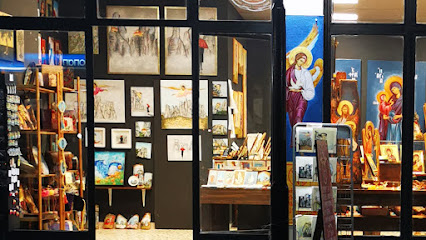
GREETINGS FROM METEORA
Explore a treasure trove of unique souvenirs inspired by Meteora's stunning landscapes at Greetings from Meteora in Kalambaka.
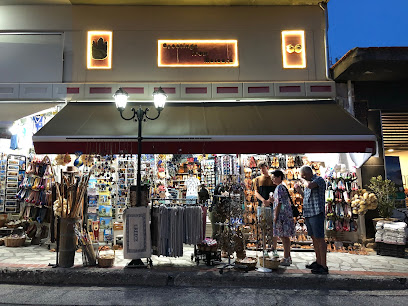
Agora Meteoron
Explore Agora Meteoron in Kalampaka for unique Greek souvenirs and crafts that capture the essence of Meteora's breathtaking beauty.
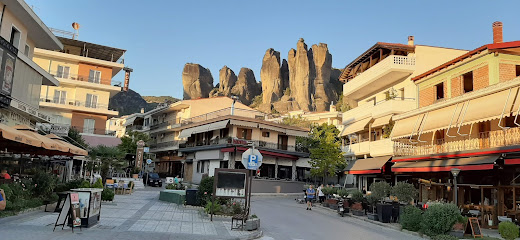
jonisport meteora fashion
Explore Jonisport Meteora for stylish clothing and unique accessories in the heart of Kalampaka, Greece, while enjoying the breathtaking Meteora views.
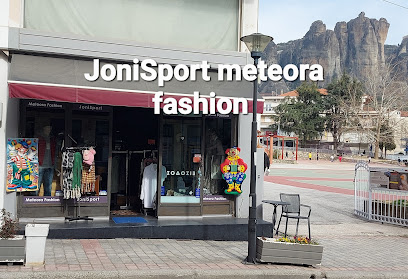
Meteora Sandals (Ekfrasi)
Discover handcrafted sandals and authentic Greek souvenirs at Meteora Sandals (Ekfrasi) in Kalampaka, where tradition meets craftsmanship.
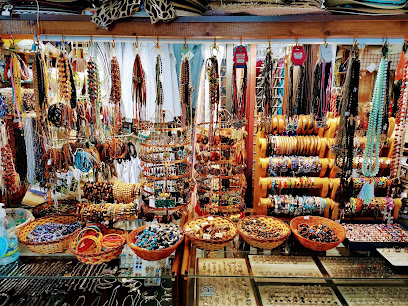
Grocery kiosk by Greek Natural Meteora family
Discover local flavors and traditional Greek treats at the Grocery Kiosk by Greek Natural Meteora, a must-visit for every traveler in Μουργκάνη.
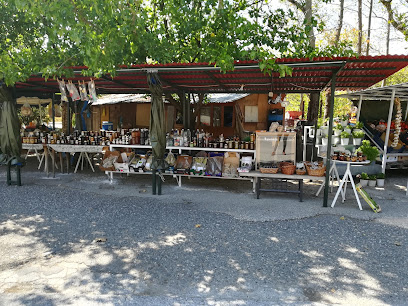
FURNITURE KERASOVITI Aristotle
Discover exquisite craftsmanship at Furniture Kerasoviti Aristotle, a unique furniture store in Kalabaka, Greece, offering timeless designs and quality pieces.
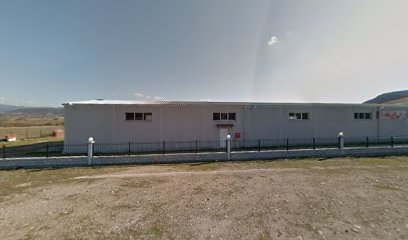
Ο Φούρνος Με Τα Ξύλα
Discover the authentic flavors of Kalampaka at Ο Φούρνος Με Τα Ξύλα, where traditional wood-fired baking meets local craftsmanship.
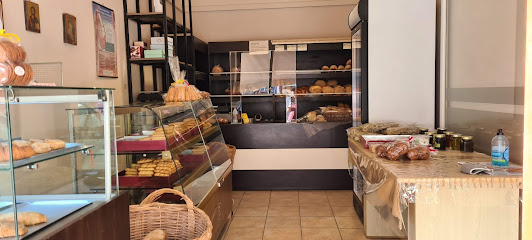
byzantine icons producer kogiannis Georgios
Discover the rich artistry of Byzantine icons at Kogiannis Georgios in Meteora, where faith meets exquisite craftsmanship.
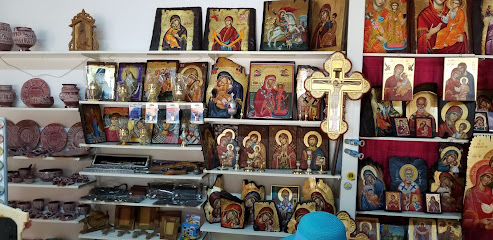
Meteora Gift House
Explore the charm of Greek craftsmanship at Meteora Gift House - your destination for unique souvenirs and local treasures in Kalampaka.
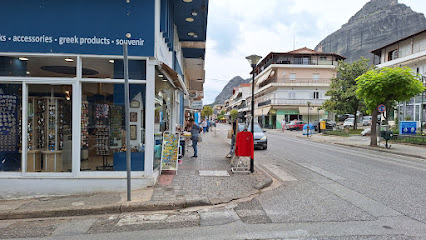
Gift Shop
Explore the Kalampaka Gift Shop for unique Greek souvenirs and handcrafted treasures that capture the spirit of your travels.

Essential bars & hidden hideouts
Restaurant Meteora Gkertsou Family
Experience authentic Greek cuisine at Restaurant Meteora Gkertsou Family in Kalampaka, surrounded by the breathtaking Meteora rock formations.
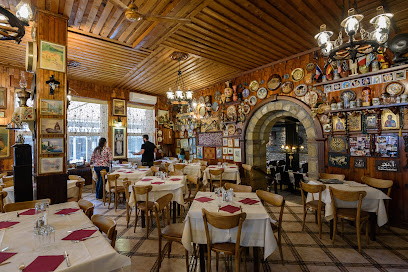
Meteoron Panorama
Experience authentic Greek cuisine with stunning views at Meteoron Panorama in Meteora, a must-visit for every traveler.
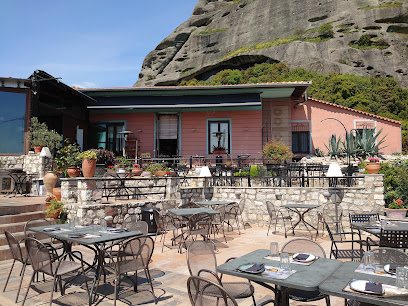
Feel the Rocks
Discover the flavors of Greece at Feel the Rocks, where culinary excellence meets breathtaking views of the Meteora rock formations.
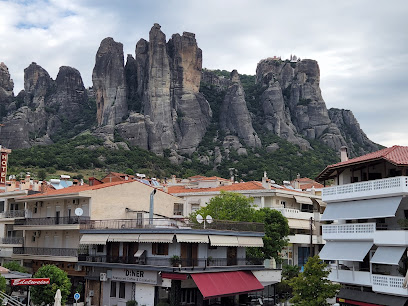
Taverna Gardenia
Discover the authentic flavors of Greece at Taverna Gardenia in Kastraki, a local favorite for traditional cuisine and warm hospitality.
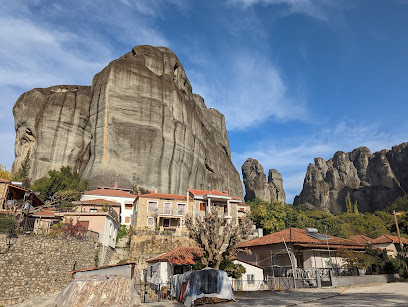
Fortounis Tsipouradiko
Discover the heart of Greek cuisine at Fortounis Tsipouradiko in Kalampaka, where every dish is a celebration of flavor and tradition.
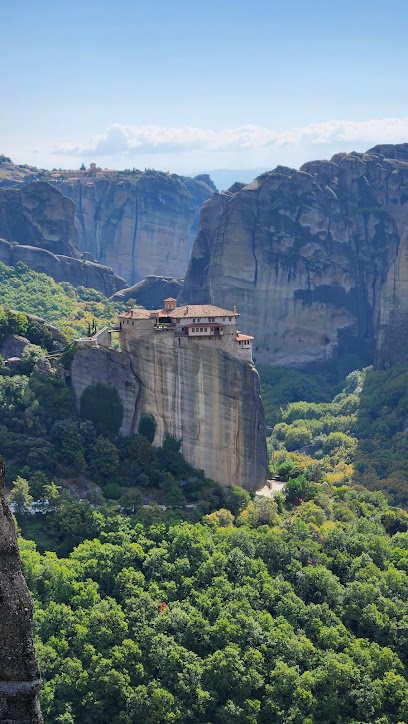
Archontariki Taberna
Experience the authentic flavors of Greece at Archontariki Taberna, a must-visit restaurant in Kalampaka near the stunning Meteora.
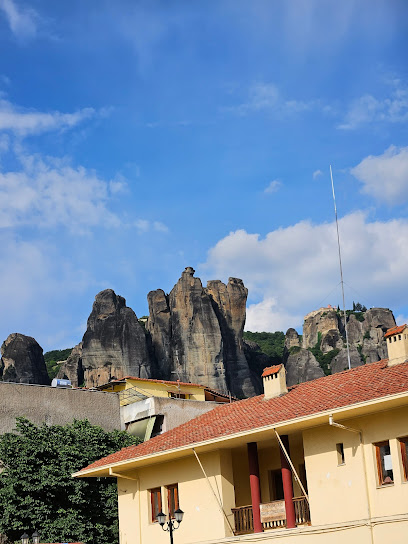
Elias Garden
Experience authentic Greek cuisine and vibrant live music at Elias Garden, a culinary gem in the heart of Kalampaka, Greece.
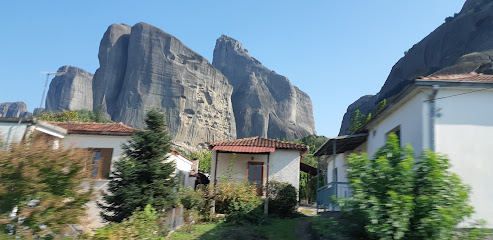
Aérino
Discover Aérino, a vibrant bar and live music venue in Kalampaka, offering delightful drinks and stunning views of the Meteora rocks.
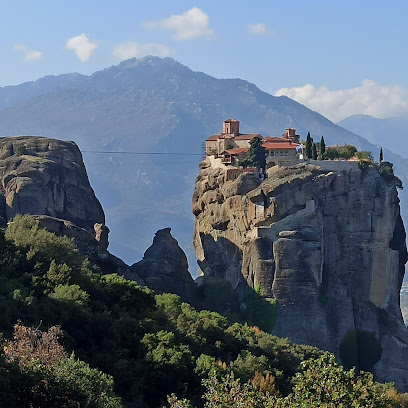
Valia Calda Taverna Restaurant
Discover the flavors of Greece at Valia Calda Taverna, a local favorite in Kalampaka, offering authentic dishes and an extensive wine selection.
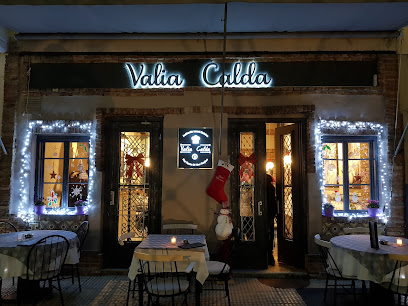
Yamas Taverna Restaurant Kalambaka Meteora
Savor authentic Greek cuisine with stunning views of Meteora at Yamas Taverna Restaurant in Kalambaka.
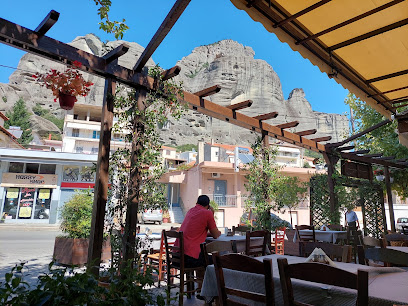
The DINER & Cocktail Bar by Rapsodia
Discover the perfect blend of casual dining and vibrant nightlife at The DINER & Cocktail Bar by Rapsodia in Kalampaka, near the stunning Meteora.
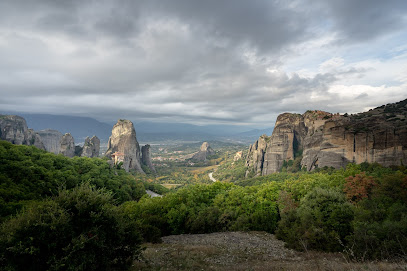
Taverna Dionisos
Discover the authentic flavors of Greece at Taverna Dionisos, a cozy restaurant in Kalampaka with stunning views and delicious traditional dishes.
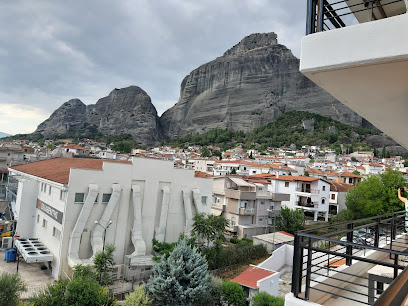
Stefanos Meteora Tavern
Experience the authentic flavors of Greece at Stefanos Meteora Tavern, where every meal is paired with breathtaking views of Meteora's stunning landscapes.
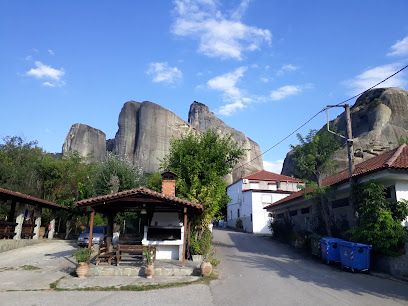
Qastiro Meteora
Discover the flavors of Greece at Qastiro Meteora, a charming bar and bistro nestled among the stunning landscapes of Meteora.
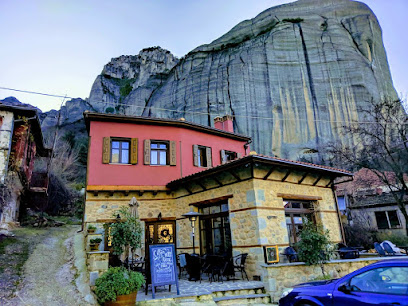
Travel experiences inspired by this city
Explore more travel diariesLocal Phrases
-
- HelloΓειά σας
[Ya sas] - GoodbyeΑντίο
[Adio] - YesΝαι
[Ne] - NoΌχι
[Ohi] - Please/You're welcomeΠαρακαλώ
[Parakalo] - Thank youΕυχαριστώ
[Efharisto] - Excuse me/SorryΣυγγνώμη
[Signomi] - How are you?Πώς είστε;
[Pos iste?] - Fine. And you?Καλά. Εσείς;
[Kala. Esis?] - Do you speak English?Μιλάτε Αγγλικά;
[Milate Agglika?] - I don't understandΔεν καταλαβαίνω
[Den katalaveno]
- HelloΓειά σας
-
- I'd like to see the menu, pleaseΘα ήθελα να δω το μενού, παρακαλώ
[Tha ithela na do to menu, parakalo] - I don't eat meatΔεν τρώω κρέας
[Den troo kreas] - Cheers!Υγεία!
[Ygeia!] - I would like to pay, pleaseΘα ήθελα να πληρώσω, παρακαλώ
[Tha ithela na plirosso, parakalo]
- I'd like to see the menu, pleaseΘα ήθελα να δω το μενού, παρακαλώ
-
- Help!Βοήθεια!
[Voithia!] - Go away!Φύγε!
[Fiye!] - Call the Police!Καλέστε την Αστυνομία!
[Kaleste tin Astynomia!] - Call a doctor!Καλέστε γιατρό!
[Kaleste giatro!] - I'm lostΈχω χαθεί
[Eho hathi] - I'm illΕίμαι άρρωστος
[Eime arrostos]
- Help!Βοήθεια!
-
- I'd like to buy...Θα ήθελα να αγοράσω...
[Tha ithela na agoraso...] - I'm just lookingΑπλά κοιτάω
[Apla kitao] - How much is it?Πόσο κοστίζει;
[Poso kostizi?] - That's too expensiveΑυτό είναι πολύ ακριβό
[Afto ine poli akribo] - Can you lower the price?Μπορείτε να μειώσετε την τιμή;
[Borite na mieosete tin timi?]
- I'd like to buy...Θα ήθελα να αγοράσω...
-
- What time is it?Τι ώρα είναι;
[Ti ora ine?] - It's one o'clockΕίναι μία ώρα
[Ine mia ora] - Half past (10)Μισή (10)
[Misi (10)] - MorningΠρωί
[Proi] - AfternoonΑπόγευμα
[Apoyevma] - EveningΒράδυ
[Vradi] - YesterdayΧθες
[Hthes] - TodayΣήμερα
[Simera] - TomorrowΑύριο
[Avrio] - 1Ένα
[Ena] - 2Δύο
[Dio] - 3Τρία
[Tria] - 4Τέσσερα
[Tessera] - 5Πέντε
[Pente] - 6Έξι
[Exi] - 7Εφτά
[Efta] - 8Οκτώ
[Okto] - 9Εννέα
[Ennea] - 10Δέκα
[Deka]
- What time is it?Τι ώρα είναι;
-
- Where's a/the...?Πού είναι ένα/το...;
[Pou ine ena/to...?] - What's the address?Ποια είναι η διεύθυνση;
[Poia ine i diefthinsi?] - Can you show me (on the map)?Μπορείτε να μου δείξετε (στο χάρτη);
[Borite na mou dixete (sto charti)?] - When's the next (bus)?Πότε είναι το επόμενο (λεωφορείο);
[Pote ine to epomeno (leoforeio)?] - A ticket (to ....)Ένα εισιτήριο (για ....)
[Ena isitirio (gia ....)]
- Where's a/the...?Πού είναι ένα/το...;
History of Meteora
-
Meteora, meaning 'suspended in the air' or 'in the heavens above,' is a geological wonder formed millions of years ago. The unique rock formations are a result of sandstone and conglomerate weathering over time. The area was once covered by an ancient sea, and as the water receded, the landscape we see today began to take shape.
-
Evidence suggests that human habitation in Meteora dates back to the Paleolithic era. The first settlers were likely hunters and gatherers who found refuge in the caves and crevices of the imposing rock formations. These early inhabitants left behind stone tools and artifacts, giving us a glimpse into their primitive lifestyle.
-
The 9th century marked the arrival of hermit monks who sought solitude and spiritual enlightenment amidst the towering rocks of Meteora. These early ascetics lived in caves and led austere lives dedicated to prayer and contemplation. Their presence laid the foundation for the monastic tradition that would flourish in the region.
-
During the 14th century, Meteora saw the establishment of its first monasteries. The Byzantine monk Athanasios Koinovitis founded the Great Meteoron Monastery in 1344, setting a precedent for other monastic communities. At its peak, Meteora was home to 24 monasteries, each perched precariously atop the rock pillars and accessible only by rope ladders or baskets.
-
The monasteries of Meteora played a crucial role during the Ottoman occupation of Greece. They served as centers of resistance and preservation of Greek culture, language, and Orthodox Christian traditions. Despite the challenges posed by the Ottoman rule, the monastic communities continued to thrive and maintain their religious practices.
-
In the 20th century, Meteora experienced a resurgence of interest as a site of cultural and historical significance. In 1988, the Meteora monasteries were designated a UNESCO World Heritage Site, recognizing their outstanding architectural and cultural value. Today, six of the original monasteries remain active and are open to visitors, offering a glimpse into the rich spiritual heritage of the region.
-
Meteora is not only a testament to human ingenuity but also a symbol of spiritual devotion. The monasteries house invaluable religious artifacts, manuscripts, and icons, preserving centuries of Orthodox Christian history. The area's unique blend of natural beauty and human achievement continues to inspire awe and reverence among visitors from around the world.
Meteora Essentials
-
Meteora is located in central Greece, near the town of Kalambaka. The closest major city is Thessaloniki, approximately 230 kilometers away. The nearest international airports are Thessaloniki Airport (SKG) and Athens Airport (ATH). From Thessaloniki, you can take a direct train or bus to Kalambaka, which takes around 3-4 hours. From Athens, the journey by train or bus takes around 5 hours. Alternatively, you can rent a car and drive to Meteora, which allows for more flexibility in exploring the region.
-
Kalambaka is the main hub for visiting Meteora and has a well-connected network of local buses and taxis. Buses run frequently between Kalambaka and the monasteries, though schedules can be limited, especially on weekends. Taxis are available and offer a convenient way to reach the monasteries, but it's advisable to agree on a fare beforehand. Renting a car or scooter can also be a great option to explore Meteora at your own pace. Walking and hiking are popular ways to experience the area, with well-marked trails connecting the monasteries.
-
The official currency in Greece is the Euro (EUR). Credit and debit cards are widely accepted in Kalambaka and at the monasteries, but it is advisable to carry some cash for smaller purchases or in case you visit remote areas. ATMs are readily available in Kalambaka, but ensure you have enough cash before heading to the monasteries, as there are no ATMs at the sites.
-
Meteora and Kalambaka are generally safe destinations for tourists. Petty crime, such as pickpocketing, is relatively rare but can occur in crowded areas, so always keep an eye on your belongings. Avoid walking alone at night in unfamiliar areas, and use common sense when exploring remote sites. There are no specific high-crime areas targeting tourists, but staying vigilant is always a good practice.
-
In case of an emergency, dial 112, the European emergency number. Kalambaka has a local police station and medical facilities, including a hospital and pharmacies. It is advisable to have travel insurance that covers medical emergencies. For minor health issues, pharmacies in Kalambaka can provide over-the-counter medications. Always carry a copy of your passport and emergency contact information.
-
Fashion: Do dress modestly, especially when visiting the monasteries. Shoulders and knees should be covered, and some monasteries provide skirts or scarves if needed. Religion: Do respect the religious nature of the monasteries. Maintain silence and reverence inside the churches and refrain from taking photographs where prohibited. Public Transport: Do be respectful to other passengers and keep noise levels low. Don't eat or drink on public transport. Greetings: Do greet locals with a friendly 'Kalimera' (Good morning) or 'Kalispera' (Good evening). A handshake is a common greeting. Eating & Drinking: Do try local dishes and delicacies. Greek hospitality is generous, so don't refuse food or drink offerings as it may be considered impolite.
-
To experience Meteora like a local, consider visiting in the early morning or late afternoon to avoid crowds and enjoy the serene atmosphere. Engage with locals in Kalambaka and the nearby village of Kastraki; they are often friendly and willing to share insights about the area. Don't miss the opportunity to hike some of the trails connecting the monasteries for breathtaking views and a deeper connection with the landscape. For a unique experience, visit the Natural History Museum of Meteora and Mushroom Museum in Kalambaka.
Trending Landmark in Meteora
-
Holy Monastery of the Great Meteoron -Transfiguration of the Saviour
-
Monastery of Varlaam
-
Holy Monastery of Saint Stephan
-
Monastery of the Holy Trinity at Meteora
-
Natural History Museum of Meteora and Mushroom Museum
-
Holy Monastery of Rousanos - Saint Barbara
-
Holy Monastery of Saint Nicholas Anapafsas at Meteora
-
Main Observation Deck of Meteora
-
Museum of Geological Formations of Meteora
-
Holy Monastery of Agio Theodoroi
-
Holy Monastery Vytouma, Kalampaka, Trikala
-
Point de vue
-
Metéōra
-
Meteora, Greece
Nearby Cities to Meteora
-
Things To Do in Ioannina
-
Things To Do in Larissa
-
Things To Do in Katerini
-
Things To Do in Lamia
-
Things To Do in Volos
-
Things To Do in Gjirokastër
-
Things To Do in Saranda
-
Things To Do in Corfu
-
Things To Do in Thessaloniki
-
Things To Do in Tepelenë
-
Things To Do in Pogradec
-
Things To Do in Delphi
-
Things To Do in Patras
-
Things To Do in Berat
-
Things To Do in Vlorë





















